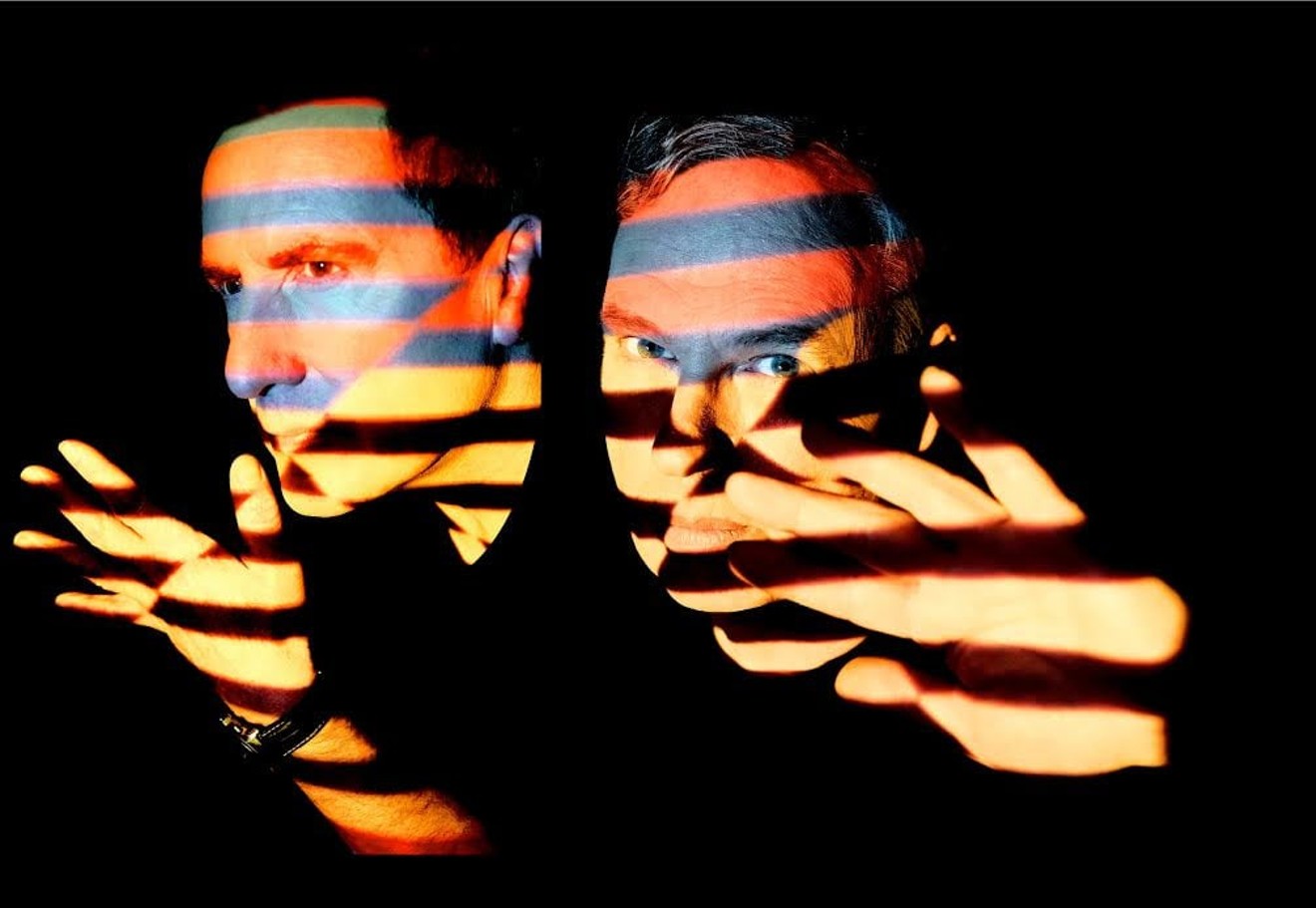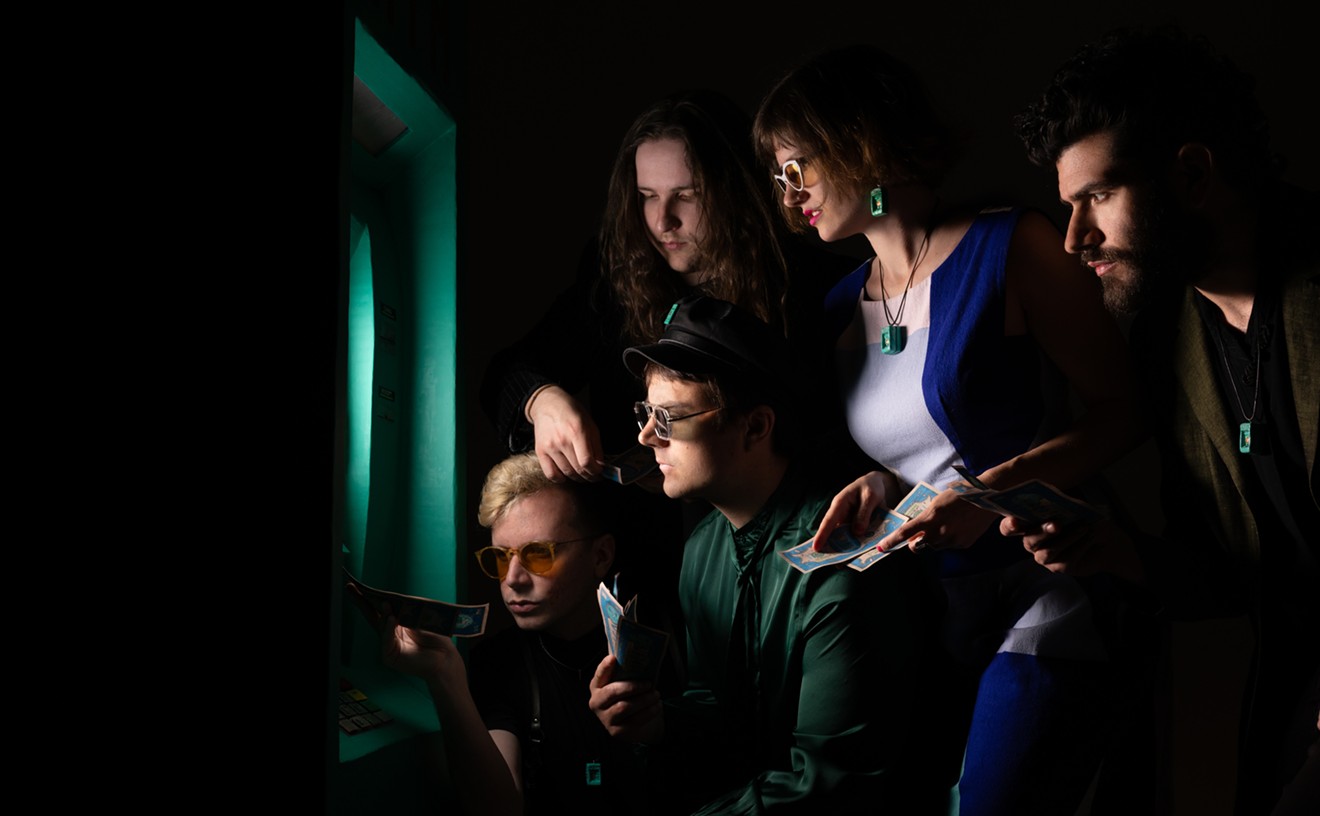Andy McCluskey isn't sure if he'd call himself a romantic. The frontman and bassist for Orchestral Manoeuvres in the Dark (OMD) has spent his career in constant motion, leaving little time to analyze himself or his songwriting.
His curiosity and enthusiasm for history, technology, and politics repeatedly bled into the cult '80s electronic band’s lyrics under a pretty shade of pink. The Liverpool group's dulcet lyrics explored everything from the wonders of telegraphs and atomic bombs to a tragic romance with Joan of Arc.
“Whilst I wanted to write songs that had an intellectual content, I seemed to view them with emotion, and often a melancholy emotion,” McCluskey admits. “When I’m singing about an oil refinery [in the song 'Sealand'], it’s like it’s a love song to that oil refinery. And when I sang about Joan of Arc, it was as if she was a woman who’d broken my heart. I tend to view objects and historical figures with a sense of romance. I don’t know why, but it just seems to work for me.”
McCluskey acknowledges that his infatuation with the world around him is what defines OMD’s peculiar stance in '80s pop music.
“The music was made by machines, but the melodies and the top-line vocals cut against that rigidity completely accidentally, creating this tension which is where OMD exists,” he adds. Name-checking the band's 1981 album, Architecture & Morality, he continues, “This tension between the architecture and the morality is our sound — just this soaring melancholy which is entirely accidental, but that’s what we do.”
McCluskey is in a reflective mood as OMD is gearing up for the release of Souvenir, a box set celebrating the band's 40th anniversary. The group is also celebrating by touring alongside the B-52’s and the New Wave band Berlin, which also turned 40 this year. The bands have been touring the nation since May and are set to play Fort Lauderdale's Broward Center this Thursday, August 29.
No one is more surprised about OMD's four-decade career than its members. The group, which began as a love letter to German bands Kraftwerk and Neu!, grew from a passion project into one of England’s most beloved pioneering synth outfits. McCluskey remembers where it all began for him and his fellow founding member, keyboardist and singer Paul Humphreys.
The two grew up doors away from each other and bonded over a shared hatred for guitar-driven macho rock. “The mid-'70s were dominated by guys with long hair and flared trousers, standing there kind of using their guitars as phallic symbols, and we just found it all very clichéd and boring,” McCluskey explains.
They both idolized David Bowie and the krautrock that introduced them to music carried solely by synthesizers.
“When I first saw Kraftwerk, it was September 11, 1975, at the Liverpool Empire," McCluskey shares. "I even remember which seat I was in — Q36 — because it was the first day of the rest of my life... That was when I thought, OK, this is what I want to do. But I had no idea it would turn into an actual musical career. It was just a crazy hobby.
"We started writing songs in [Humphrey's] mom’s backroom when she went to work on Saturdays. But, to be honest, even our friends thought they were pretty crappy, so we never thought this was going to be anything close to a career. But finally, in 1978, we dared to get onstage, and that’s how it started," he recalls.
The two wrote their first single, “Electricity,” when they were 16 and 15. Vince Clarke, of Depeche Mode, Erasure, and Yazoo fame, once told the BBC that the song inspired him to get ahold of some synths to write electronic music of his own.
OMD's first four records celebrated the bandmates' early influences and were well received by audiences and critics. Their fourth album, 1983’s Dazzle Ships, was their most experimental at the time, alienating the press and costing them loads in sales and fans. The commercial failure set them back creatively and forced them to focus on poppier, more immediate songs centered on real human love rather than imaginary ones with historical figures.
But even their poppiest records of that postexperimental era, such as Junk Culture and Crush, were clever and beautifully arranged. The band still wasn't fully holding back on having fun in the studio.
“We kind of consciously and unconsciously decided to dial down some of the experiments and dial up some of the melodies,” McCluskey says. “‘We had to think, This is our job, this is how we pay the bills, so we better be more careful."
Ships has since been reframed as an album ahead of its time and cited by artists such as Saint Etienne, Death Cab for Cutie, and Mark Ronson as personal favorites. “Now it’s considered an amazing masterpiece,” McCluskey says. “But at the time, it nearly killed our career commercially.”
By 1986’s The Pacific Age, OMD's biggest record in the United States, the bandmates thought their music was half-baked due to financial pressure from their label, forcing them to tour and put out new music constantly. They later saw a big boost on the U.S. charts with “If You Leave,” the prom theme to John Hughes’ Pretty in Pink, which they wrote at 120 bpm per the director’s request to fit the sequence.
Originally, they wrote the track "Goddess of Love," later used on The Pacific Age, for the feature. The song was meant to fit the film's original ending, where Molly Ringwald's character, Andie, ends up with her best friend, Jon Cryer's Duckie, rather than the preppy pretty boy, Lane, played by Andrew McCarthy.
The ending was poorly received by test audiences, so the band was asked to deliver a new track to fit the updated conclusion and appease viewers. The bandmates had 24 hours to write, demo, and submit the track, which would become their most recognized song.
“We love it. It’s been very good to us," McCluskey says of the track. "I don’t understand bands who bitch about their favorite songs, going, 'Oh, I’m so bored of it.' Like, have some respect for the tune!” he jokes.
Going into the ’90s, keyboardist Humphreys departed from the band, leaving McCluskey to lead it for the span of three albums, all while navigating a pop world fascinated with grunge and Britpop that didn’t have room for electronic acts from the previous decade.
“By that time, ’80s synthpop had become passé,” he says. “But with the new millennium, people began to appreciate our music once more, and ’80s music got rehabilitated.”
In the 2010s, Humphreys and McCluskey reunited for new shows and released three albums, which McCluskey says allowed them to be as weird as they were in their earlier days.
“We didn’t have to sell records,” he says of efforts such as 2013's charming English Electric. “It didn’t matter what we wrote about. We just had the freedom to be like teenagers again, making music we wanted to hear.”
Along with that renewed sense of freedom, McCluskey says he’s been warmly surprised by younger generations of music fans' interest in OMD’s catalog.
“Young electronic bands have been influenced by us, and then their fans look into us, and that’s exciting,” he says. But he’s not looking to call out bands for “emulating” OMD's sound. Those comparisons, which he calls "lazy," have been lobbed at bands such as Future Islands.
But McCluskey is aware of the current shift to ’80s musical trends. He says he’s a fan of acts such as Robyn, the XX, and even Taylor Swift, who’s recently dived into electropop.
“I pay attention [to modern pop], and I’m still a fan of very well-written pop songs,” he says. “Some of the real pop stuff is so beautifully crafted.”
Looking back on OMD's legacy and the serendipity of it all, McCluskey is filled with gratitude for the journey he got to take with his bandmates — ups and downs included.
“Orchestral Manoeuvres in the Dark was a dare to do one gig," he says, "and here we are 40 years later, celebrating it with our fans.”
The B-52’s. With Orchestral Manoeuvres in the Dark and Berlin. 7:30 p.m. Thursday, August 29, at the Broward Center for the Performing Arts, 201 SW Fifth Ave., Fort Lauderdale; browardcenter.org. Tickets cost $59 to $129 via ticketmaster.com.
[
{
"name": "Air - MediumRectangle - Inline Content - Mobile Display Size",
"component": "19274298",
"insertPoint": "2",
"requiredCountToDisplay": "2"
},{
"name": "Editor Picks",
"component": "17482312",
"insertPoint": "4",
"requiredCountToDisplay": "1"
},{
"name": "Inline Links",
"component": "18711090",
"insertPoint": "8th",
"startingPoint": 8,
"requiredCountToDisplay": "7",
"maxInsertions": 25
},{
"name": "Air - MediumRectangle - Combo - Inline Content",
"component": "17482310",
"insertPoint": "8th",
"startingPoint": 8,
"requiredCountToDisplay": "7",
"maxInsertions": 25
},{
"name": "Inline Links",
"component": "18711090",
"insertPoint": "8th",
"startingPoint": 12,
"requiredCountToDisplay": "11",
"maxInsertions": 25
},{
"name": "Air - Leaderboard Tower - Combo - Inline Content",
"component": "17482313",
"insertPoint": "8th",
"startingPoint": 12,
"requiredCountToDisplay": "11",
"maxInsertions": 25
}
]












